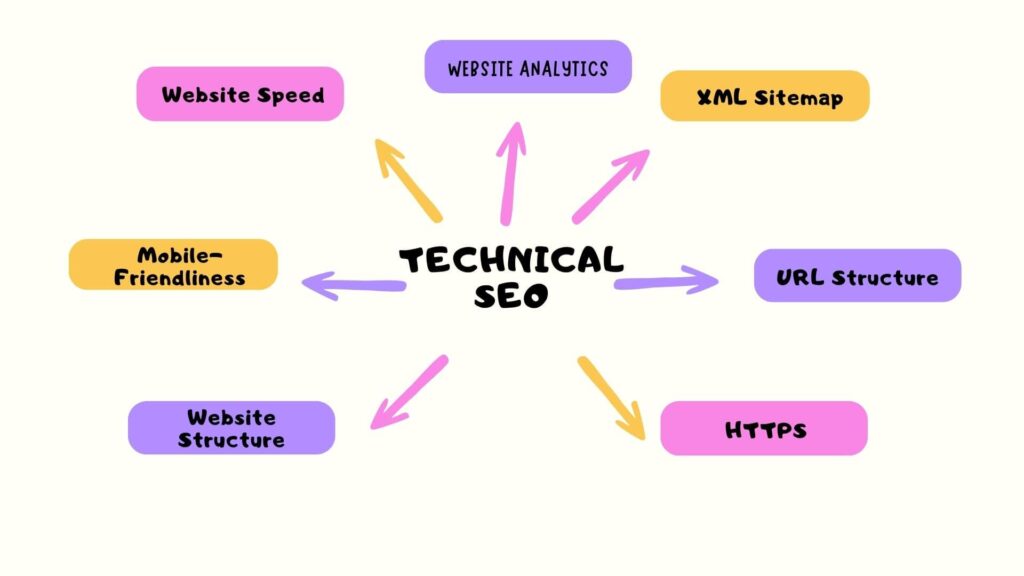
Introduction
We talked earlier in our blog about SEO And how the SEO process is done now in this blog we will discuss further details of Technical SEO. Technical SEO is a very important part of Search engine optimization, Certainly! Let’s dive a bit deeper into technical SEO using a probability analogy.
Think of technical SEO as the foundation of a building. Just as a solid foundation ensures the stability and strength of a structure, technical SEO sets the groundwork for your website’s visibility in search engine results.
Now, imagine you have a treasure hidden in a maze, and you want search engines to find it easily. Technical SEO acts as a map and guide for search engines, making it more likely for them to discover and understand your content effectively.
Here are a few technical SEO factors and their explanations:
Website Speed
Faster websites have a higher probability of ranking well in search results. So Optimize your website’s code, compress images, and leverage caching techniques to improve page load times. When your website loads quickly, search engines can crawl and index more pages within a limited time, increasing the chances of your content being discovered by users.

Mobile-Friendliness
As mobile usage continues to rise, search engines prioritize mobile-friendly websites. So Ensure your website is mobile-friendly and provides a seamless experience across devices. If your website is well-optimized for mobile devices, it has a higher probability of your website to appearing in search results when users search on their phones or tablets.

Website Structure
A well-organized website structure increases the probability of search engines correctly understanding the hierarchy and relationship between your pages. This helps them navigate through your site more efficiently and deliver relevant results to users.

XML Sitemap
Providing search engines with an XML sitemap increases the probability of all your important pages being discovered and indexed. So Generate and submit XML sitemaps to search engines. It’s like giving them a comprehensive list of all the rooms in the maze, making it easier for them to locate the treasure (your content).
URL Structure
Using clean, descriptive URLs enhances the probability of users and search engines understanding what a page is about before even clicking on it. It’s like having signposts in the maze that clearly indicate what’s inside each room.
Canonicalization
By specifying canonical tags, you reduce the probability of content duplication issues. This helps search engines understand which version of a page is the primary one, consolidating the SEO value and preventing confusion.
HTTPS and Security
Secure your website with an SSL certificate, enabling HTTPS. HTTPS (Hypertext Transfer Protocol Secure) is the secure version of HTTP
This provides a secure connection and builds trust with both users and search engines.
The padlock icon and “Secure” label in the browser’s address bar indicate a secure connection, reassuring visitors that their information is protected.
Regularly update your SSL certificate to maintain security and compatibility

Website Analytics and Monitoring
Implement website analytics tools, such as Google Analytics, to track website performance, user behavior, and identify areas for improvement.
By implementing analytics tools on your website, these tools collect data about visitor behavior, demographics, traffic sources, page views, conversions, and more.

Crawlability and Indexability
Ensure search engine bots can crawl and index your website effectively.
Check for crawl errors, broken links, and ensure important pages are not blocked by robots.txt or meta tags.
Make sure your website doesn’t have any technical issues that prevent crawlers from accessing it, such as server errors or excessive load times.
Avoid duplicate content issues.
Search engines prefer unique and original content.
If you have duplicate content on your website, use canonical tags to specify the preferred version of the page.
Conclusion
By focusing on these Technical SEO factors, you increase the likelihood of your website being discovered, understood, and ranked higher in search results. Just as a well-designed treasure map increases the probability of finding the hidden treasure in the maze, technical SEO increases the probability of search engines finding and ranking your valuable content.
FAQ
What is technical SEO?
Technical SEO refers to the foundational optimization of a website that enables search engines to discover and understand its content effectively.
Why is website speed important for technical SEO?
Faster websites have a higher probability of ranking well in search results, as they improve user experience and allow search engines to crawl and index more pages within a limited time.
How does mobile-friendliness impact technical SEO?
Mobile-friendliness is crucial for technical SEO because search engines prioritize mobile-friendly websites to provide a seamless experience across devices.
What role does website structure play in technical SEO?
A well-organized website structure helps search engines navigate and understand the hierarchy and relationship between pages, improving the delivery of relevant results.
Why is an XML sitemap important for technical SEO?
An XML sitemap serves as a map for search engines, increasing the probability of all important pages being discovered and indexed on your website.
What is the significance of HTTPS and security in technical SEO?
Enabling HTTPS through an SSL certificate enhances security, builds trust with users and search engines, and positively impacts search engine rankings.
How does website analytics and monitoring contribute to technical SEO?
Implementing website analytics tools allows you to track performance, user behavior, and identify areas for improvement, leading to better optimization of your website for search engines.
What is crawlability and indexability in technical SEO?
Crawlability ensures search engine bots can access your website, while indexability ensures that important pages are properly indexed and included in search engine results.
How does canonicalization affect technical SEO?
Canonicalization reduces the probability of content duplication issues, helping search engines understand the preferred version of a page and consolidating its SEO value.
Why is website security important for technical SEO?
Website security, including implementing HTTPS and maintaining SSL certificates, is crucial for technical SEO as it ensures a secure connection, builds user trust, and positively influences search engine rankings.
How do technical SEO factors increase the probability of website success?
By focusing on technical SEO factors such as website speed, mobile-friendliness, structure, security, analytics, and crawlability, you improve the likelihood of your website being discovered, understood, and ranked higher in search engine results.











Your point of view caught my eye and was very interesting. Thanks. I have a question for you.